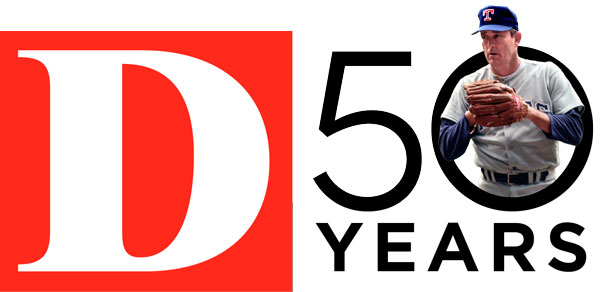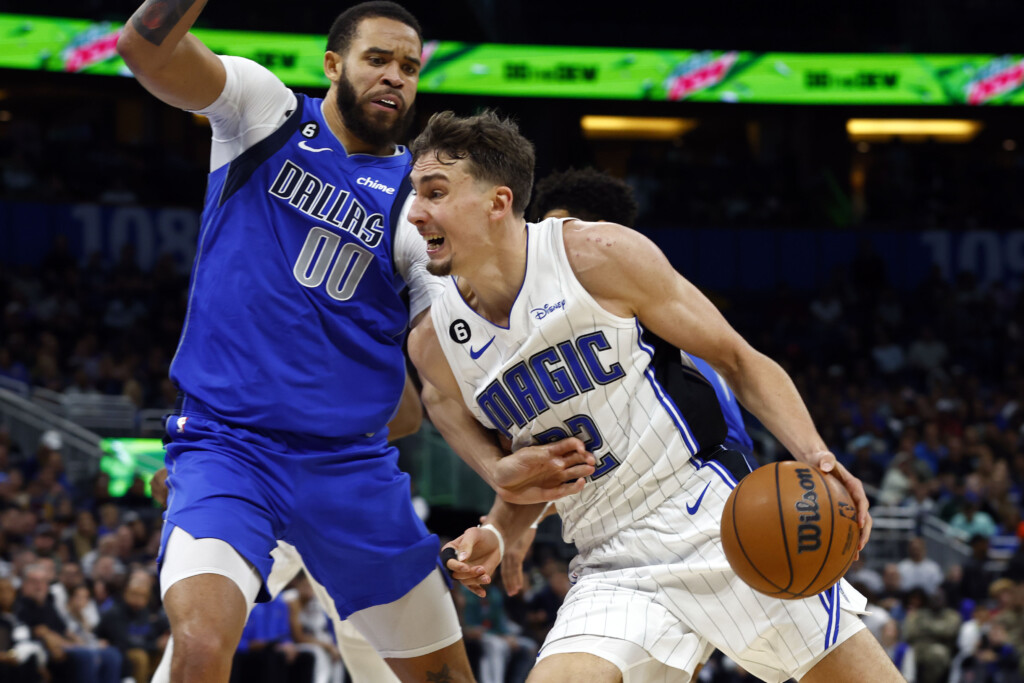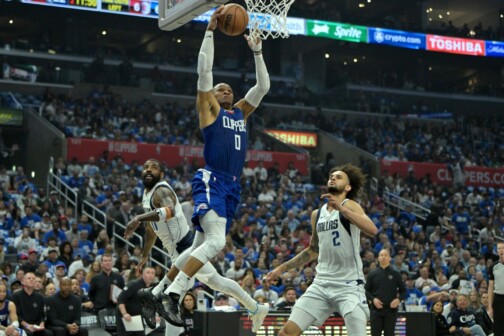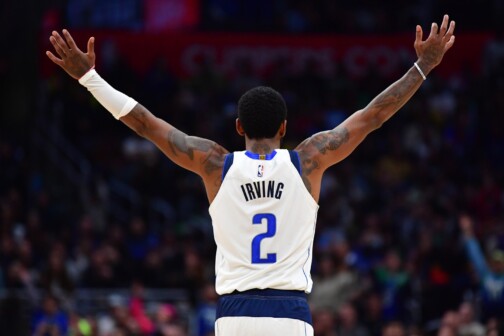Predictions are usually wrong. Sports, politics, finance, doesn’t matter—human beings are just not very good at this. But that doesn’t stop us from trying! The industry that sustains the sort of article you are now reading is based on gathering as much info as possible (though some people skip this step) and making a well-educated guess on how a team or a player’s decision-making will play out. That makes it somewhat rare to see virtually everyone who covers, analyzes, or follows a team have the same reaction to any specific move.
But sometimes a basketball team signs a 34-year-old center to a three-year contract and guarantees him a starting spot. The collective “WTF?” regarding the Mavericks’ signing of Javale McGee was vociferous and nearly uniform.
They signed who? For how much? For how long? And told him what?
Rarer still is when it takes almost no time for the masses to be proven correct. Yet here we are, just 10 games into the season, secure in the knowledge that the McGee signing was a disaster.
Typically, this team’s missteps at least have a defensible train of thought to them. For example, the Mavericks believed Jalen Brunson was a suboptimal long-term fit next to Luka Doncic. They believed that expending the resources it would take to keep him would jam up their grander team-building vision. They want a bigger guard next to Doncic and believed re-signing Brunson would preclude them from finding that guy, now or in the future. Many of us disagreed, but it is not hard to see how the club arrived at that decision.
There is no such logic underpinning the McGee signing. Yes, the defense backslid last season after the Mavericks traded away their only true rim protector in Kristaps Porzingis. Their defensive rating slipped from fifth pre-trade to 14th post-trade, which is not the stuff championship contenders are made of. So, OK, fine. They settled on the notion that for Jason Kidd’s defensive system to truly thrive, better paint protection was a must, and new addition Christian Wood wasn’t equipped to provide it. Meanwhile, over the last six seasons, McGee’s teams defended the rim at near elite levels when he was on the floor versus when he was not, per CleaningTheGlass.com.
That is where logical thinking stopped. Perhaps a one-year “who knows?” offer would have been defensible after McGee fell to third string last year in Phoenix and got phased out of the rotation at times during the Suns’ second-round series against Dallas. Instead, the Mavericks seemingly took a rebound on credit, awarding him the sort of long-term deal (the third year of this deal is an option—his option) and status (in addition to guaranteeing him that starting spot, the Mavericks also announced that part of the pact to the world) worthy of a team focal point.
It smacked of hubris. McGee was last a regular starter in 2019-20 with the Lakers, winning a championship in the bubble. Kidd, of course, was an assistant with that team. But that was one of just four seasons in McGee’s 14-year NBA career when he was a regular starter. Injuries have been a factor, but the facts are what they are: for most of his career, McGee has not been counted on to start and set the tone in the paint. The Mavericks looked at all of this and still decided they wanted to sign McGee through his age-37 season, then publicly backed themselves into a corner with his role.
What did they get for their money?
After starting the first six games in which he was available to play, McGee has since traded starts with Dwight Powell, the player he was brought in to replace. His already meager minutes have been cut almost in half, from 12 per game in October to 6.8 in November.
But this tells us all we need to know, or really, that the Mavericks already know what we suspected: he is borderline unplayable and on balance in no way an upgrade over Powell. In their fervor to replace Powell with a more “traditional” rim protector, they brought in a player who at this stage of his career appears incapable of performing that task.
Dallas is yielding a lower field goal percentage at the rim when McGee isn’t on the floor. Allow me to re-emphasize: he was brought here to address one area above all, but the Mavericks are better when he doesn’t play. They don’t protect the rim well, McGee or not. They are 23rd in the NBA in field goal percentage allowed at the rim. Last season after the Porzingis trade they were 22nd.
Offensively, he is negative. McGee’s pick-and-roll efficiency numbers over the last few seasons were respectable enough to offer some hope of him becoming a reliable lob threat. He has been anything but: McGee is underperforming on the quality of looks he has been given at the highest rate of the last five years of his career despite playing with Doncic, who has created the highest shot quality score for his teammates over the last three seasons, per Second Spectrum. Given the circumstances, it is actually difficult to be this ineffective. Yet turn on the tape, and the Luka/McGee screen-and-roll game looks like it has never been practiced before it shows up in a game.
It’s still early. We are working on only nine games of data from McGee. But based on what we’ve seen, I have a hard time believing that McGee will suddenly regain his ability to impact shots the way he did in recent years. I have a hard time believing he’ll do that this year. Or next year. Or the year after that. Professional athletes don’t tend to improve as they get deeper into their 30s, and that’s especially true for ones standing more than seven feet tall. On the floor, the Mavericks will manage. McGee wasn’t playing much to begin with and Powell has been an improvement. Perhaps McGee only plays in injury situations, when his declining play can do minimal harm. None of that absolves this team from being on the hook for roughly 240 more games of JaVale McGee.
The money—$17.2 million over the life of the deal, presuming McGee opts into that third season—isn’t a huge issue, though it isn’t nothing. The bigger issue is how this signing informs our understanding of how this relatively new Mavericks power structure operates. Kidd and general manager Nico Harrison were generally considered a package deal. That doesn’t mean they are in lockstep on every decision. Where there is power, there will be a power struggle. The truth is, we just don’t really yet know how this hierarchy operates. In one offseason, Dallas signed a big with red flags and guaranteed him a spot and a contract. In the same offseason, they traded for Wood, another big with red flags and told him it was time to earn a spot and a contract. Kidd had previously coached one of these players and won a ring alongside him. The other is 27 and is not known for his defense while also being perhaps the second-most skilled player on the roster. One of these players has been a net negative. The other, for all of his faults, is Dallas’ best hope after Doncic of being a consistent impact scorer. Yet McGee continues to be given opportunities above his station while Kidd has said (in a borderline combative tone) that Wood needs to earn minutes and trust.
The Mavericks have one of the best players in the world and a fine roster around him. They will win a lot of games and be competitive in the playoffs. They also clearly have a rotation issue to sort out over the next couple of months. McGee is unlikely to be a part of any consistent solution to that issue. Dallas didn’t have another easy answer this offseason: resources were as scarce as the market was bare. Identifying a need is Step 1. But teams must decide whether the resources they expend and the commitments they make will suitably address those needs, and the Mavericks severely whiffed there.
It is admirable that the team has figured this out so early in the season. It is much less so that someone pounded the table for three years of this.
Get the ItList Newsletter
Author






